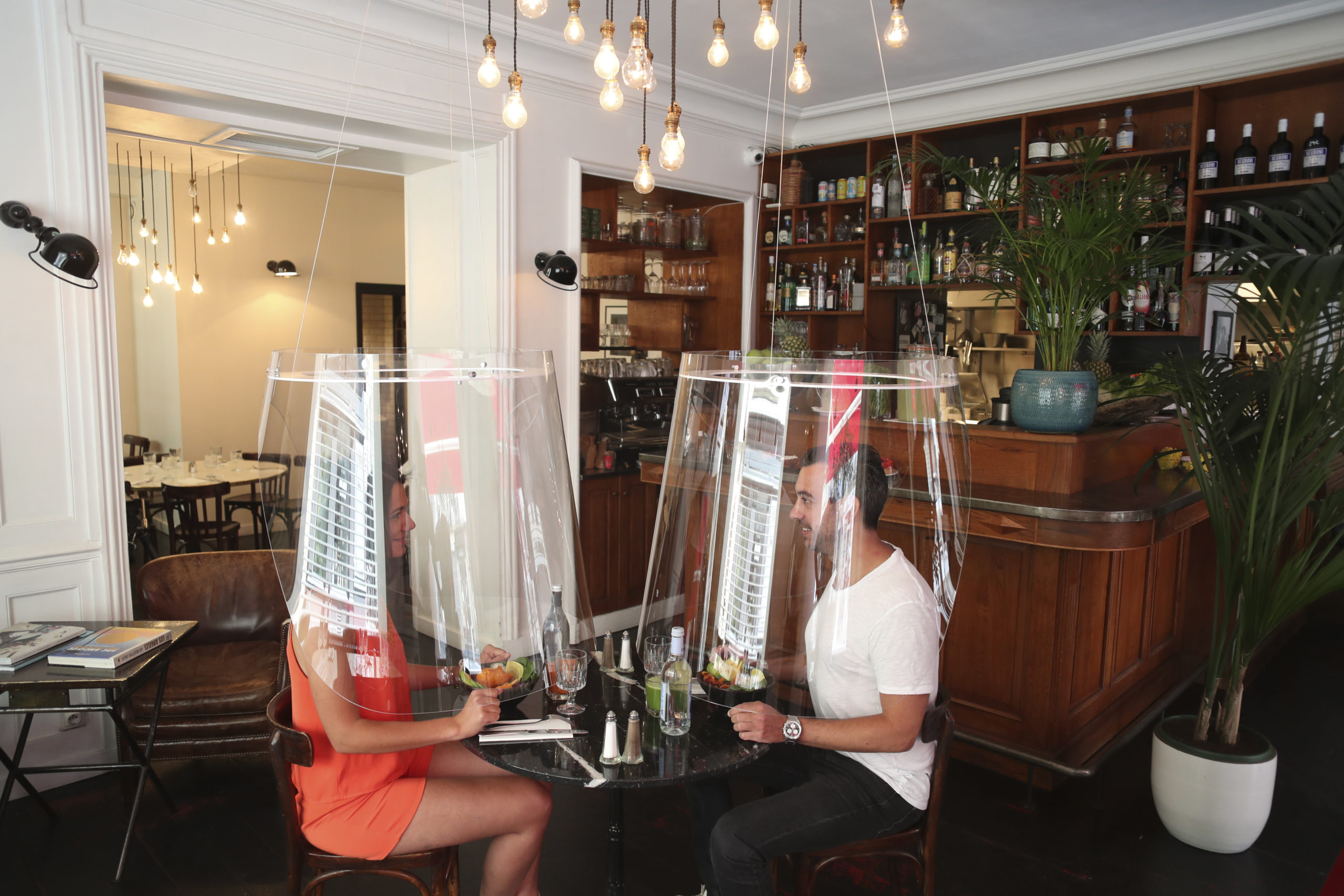Patrons under plastic: Restaurants get creative in virus era

A man and a woman demonstrate dining under a plastic shield Wednesday, May 27, 2020, in a restaurant of Paris. As restaurants in food-loving France prepare to reopen, some are investing in lampshade-like plastic shields to protect diners from the virus. The strange-looking contraptions are among experiments restaurants are trying around the world as they try to lure back clientele while keeping them virus-free. (AP Photo/Thibault Camus)
PARIS — Dining at a table where each person is enclosed by a clear plastic shield might look and sound futuristic, but it could be one way for some restaurants to reopen. It also might help out if your companion orders escargots, heavy on the garlic.
The prototype plastic shields are known as the “Plex’eat,” and they resemble big clear lampshades suspended from the ceiling. They are being showcased temporarily at H.A.N.D., a Parisian restaurant seeking a way to reopen its dining room as coronavirus restrictions are relaxed.
As restaurateurs around the world seek to resume in-person dining amid the pandemic, they want to adhere to social distancing rules while also trying to serve as many customers as health and safety measures will allow.
Some are putting mannequins at every other table to put some space between the actual customers, like at Augustas and Barbora, a restaurant in the Lithuanian capital of Vilnius. Some of its faux diners are dressed casually, while others look as though they are at a ball. The clothes showcase the work of local fashion designers.
“We want to fill the space with fun things,” said owner Patrikas Ribas.
Article continues after this advertisementVilnius Mayor Remigijus Simasius called the initiative a “perfect match of communal spirit and creativity working side by side.”
Article continues after this advertisementIn Hofheim, Germany, the Beef’n Beer is using large teddy bears seated at some tables to keep diners properly spaced apart. They also ensure a cozy, less-sterile atmosphere.
At Amsterdam’s Mediamatic restaurant, the owners have erected small glasshouses that surround each table, served by waiters in protective shields.
While many restaurants offer take-out and delivery during the health crisis to keep generating at least some income, such practices are less common in France, although Michelin starred chefs such as Alain Ducasse have started doing take-out service.
Owners are seeking solutions that will coax back customers while also easing their anxiety about catching the virus.
Mathieu Manzoni, the director of H.A.N.D, said he thinks the plastic shields are a “pretty, more poetic” solution for restaurateurs who fear that social distancing could cut their capacity by half or more.
“There is a bit of a panic,” Manzoni said.
Makers of the Plex’eat say they have received more than 200 preorders around the world, including from France, the U.S., and Japan.
Designer Christophe Gernigon said he got the idea after visiting a store in Bangkok “with three individual domes with chairs where people would sit and listen to music.”
He merged the idea with the large face shields that have proliferated since the pandemic began, although there is no filtration system to keep any viruses from spreading.
Being French, there’s a version for more intimate dining, of course: a dome that cocoons its occupants in romantic isolation from the rest of the room.
Among other revamped restaurants across Europe:
— At El Salamanca, a Barcelona beachfront restaurant known for paella, menus are gone and customers use their smart phones to scan a QR code to consult what is on offer.
— Greek restaurants are using salt and pepper sachets inside of shakers, and menus are either thrown away after each meal or are laminated and wiped down regularly. Many waiters have face shields. Some tavernas have staff in matching face masks.
— In the Russian city of Nizhny Novgorod, a restaurant on the banks of the Volga and Oka rivers has set up 20 plastic huts for couples. It is awaiting approval from authorities to open if it meets safety standards.
— Italian restaurants are using contact tracing. Diners are supposed to reserve tables ahead of time and owners are keeping their contact information: If someone subsequently reports testing positive, the restaurant can quickly identify and contact those who ate there at the same time.
Some coffee bars in central Rome also are attaching stylish arched glass partitions to divide tabletops down the middle.
/MUF
For more news about the novel coronavirus click here.
What you need to know about Coronavirus.
For more information on COVID-19, call the DOH Hotline: (02) 86517800 local 1149/1150.
The Inquirer Foundation supports our healthcare frontliners and is still accepting cash donations to be deposited at Banco de Oro (BDO) current account #007960018860 or donate through PayMaya using this link.